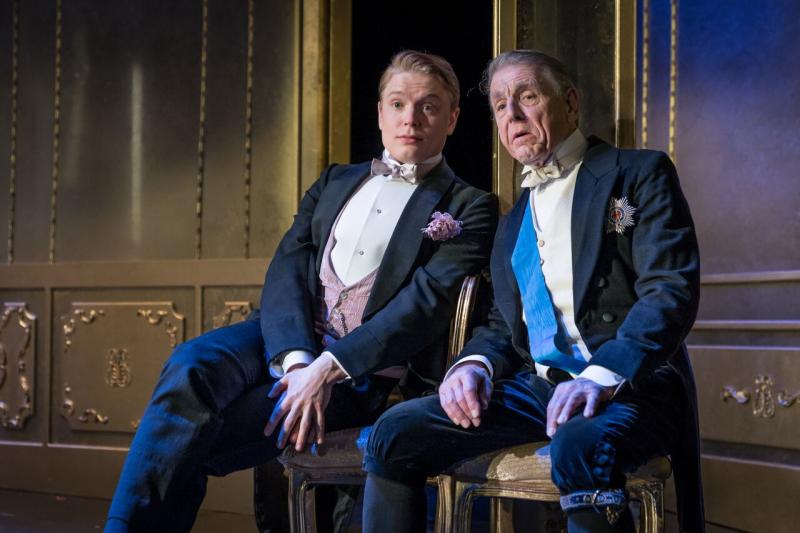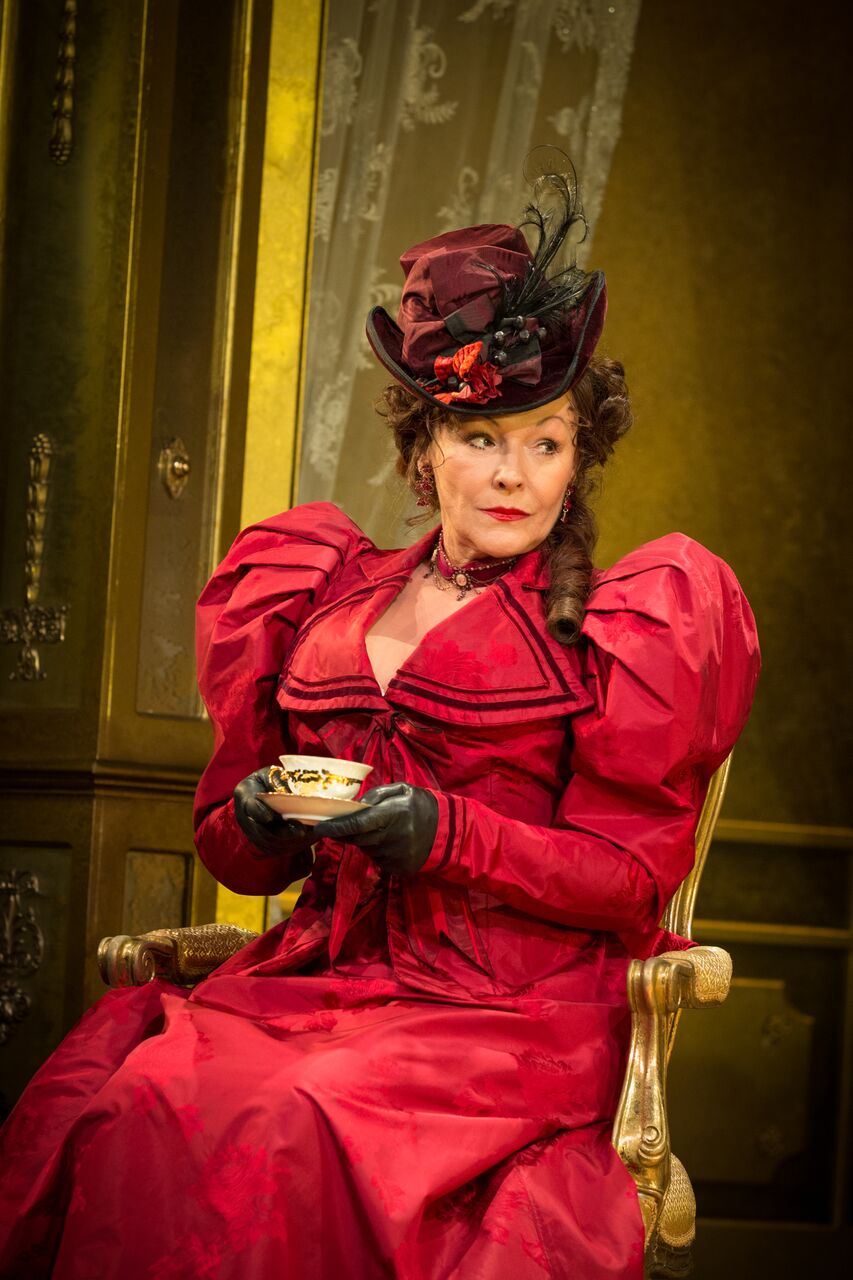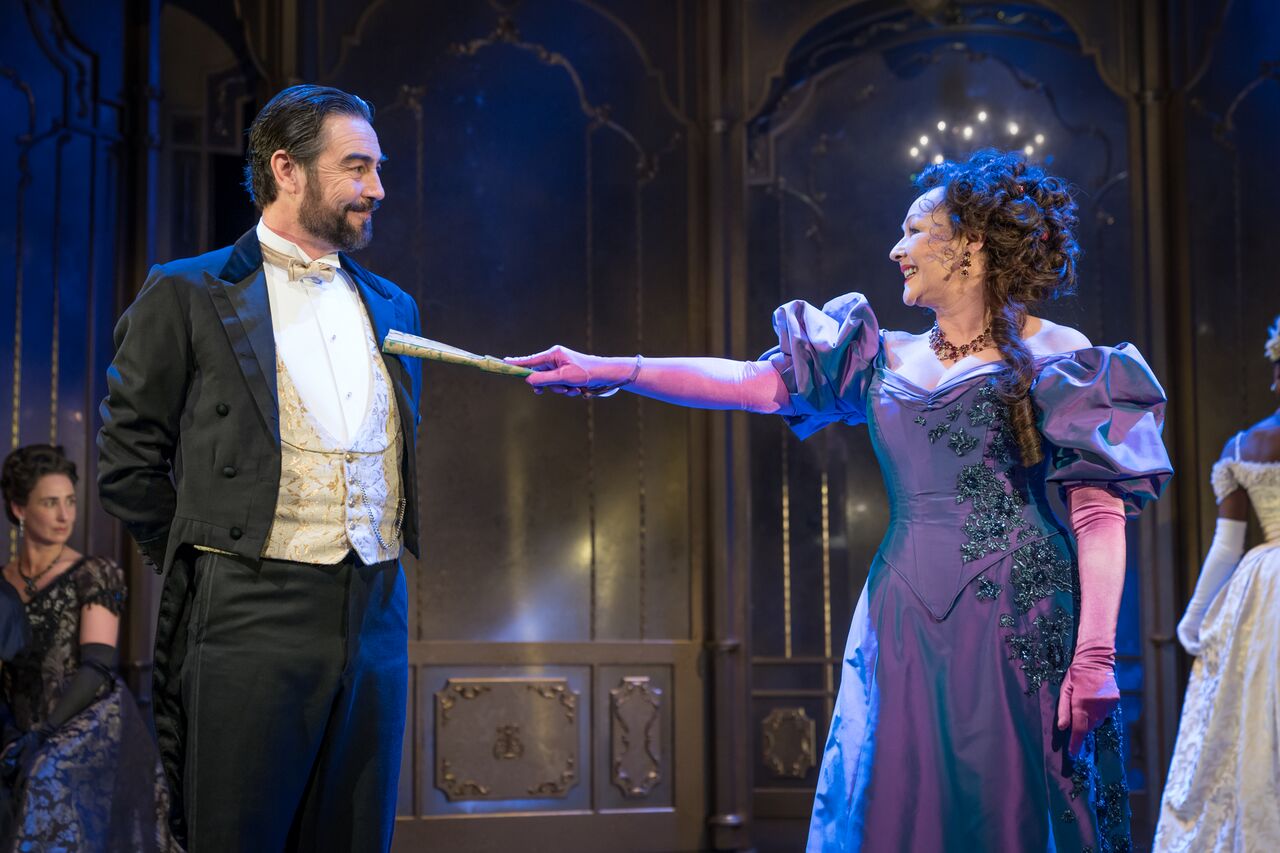An Ideal Husband, Vaudeville Theatre review - unsettled evening leaves blood on Wilde's drawing-room furniture | reviews, news & interviews
An Ideal Husband, Vaudeville Theatre review - unsettled evening leaves blood on Wilde's drawing-room furniture
An Ideal Husband, Vaudeville Theatre review - unsettled evening leaves blood on Wilde's drawing-room furniture
A strong cast can't quite pull off the author's most political play

Across London last night politicians waited anxiously to hear their fates, and things were no different at the Vaudeville Theatre, where the ongoing Oscar Wilde season took a topical turn with An Ideal Husband.
Colliding drawing-room comedy and Victorian melodrama, the play is at worst uneven, but at best it has a violence that sets the bone china rattling. The stakes of this political satire are real and high, only further raised by the knowledge that Wilde’s own society idyll was about to be shattered. Before the play’s original run had ended he was arrested, trading rubbers of bridge and bon mots for Reading Gaol.
Freddie Fox’s lighter-than-air Lord Goring holds the play’s fragile comedy in the palm of his hand
You don’t cast Frances Barber as agent provocateur Mrs Cheveley (pictured below right) if you plan to soften the play’s harder edges, but in loosing this particular theatrical tiger into his drawing room director Jonathan Church risks upsetting more than the teacups.
Caged in the tight epigrams and still-tighter corsetry of Victorian comedy, Barber’s dramatic ferocity breaks out in unexpected directions. Striding around Simon Higlett’s kitschy sets (we open with Barbie’s gold-and-mirrors Versailles Dream House, with Lord Goring’s flat offering a brief cerise interlude in Barbie’s Opium Den) as though in army boots, Barber’s tread is equally heavy through the text.
 But her rather strenuous weight is off-set by Freddie Fox’s lighter-than-air Lord Goring, who holds the play’s fragile comedy in the palm of his elegant hand throughout. The interplay between Goring and his father the Earl of Caversham is deliciously spiced by the real-life father-son pairing of Freddie and Edward Fox. The latter’s drawling delivery may be getting progressively more eccentric, but there’s a delicious energy between the duo – a sense of comfort, of ease among Wilde’s starched vowels and collars – that anchors an otherwise rather unsettled production that can’t decide if it wants to do affirmation-and-epigrams or something more serious.
But her rather strenuous weight is off-set by Freddie Fox’s lighter-than-air Lord Goring, who holds the play’s fragile comedy in the palm of his elegant hand throughout. The interplay between Goring and his father the Earl of Caversham is deliciously spiced by the real-life father-son pairing of Freddie and Edward Fox. The latter’s drawling delivery may be getting progressively more eccentric, but there’s a delicious energy between the duo – a sense of comfort, of ease among Wilde’s starched vowels and collars – that anchors an otherwise rather unsettled production that can’t decide if it wants to do affirmation-and-epigrams or something more serious.
Susan Hampshire’s Lady Markby, glinting with quality, sits awkwardly alongside Faith Omole’s costume jewel of a Mabel Chiltern, and for every moment of exquisitely pointed satirical probing there are smothering quarter-hours of glossy nullity.
The contemporary parallels of Wilde’s meticulous dissection of political hypocrisy, expediency and ambition, in which rising star politician Sir Robert Chiltern (a slightly soft-focus Nathanial Parker, pictured below, with Barber) finds himself blackmailed and brought to the brink of disgrace, make themselves. There was a particularly bitter laugh at Lady Markby’s declaration that, “our Society is terribly over-populated. Really, someone should arrange a proper scheme of assisted emigration.” But the still-sharp points of these barbs feel blunted by so much nostalgic affectation, reduced to joke-shop copies by so much camp. Where Fox, conjurer-like, produces some truth from the silk-lined pockets of the foppish Goring, Church can’t quite quite pull off the same trick. His satirical top-hat is empty, leaving the plot’s elaborate set-up making dramatic promises it just can’t keep. It may have been election week in London, but this empty bluster and political posturing feels like topicality taken a step too far.
But the still-sharp points of these barbs feel blunted by so much nostalgic affectation, reduced to joke-shop copies by so much camp. Where Fox, conjurer-like, produces some truth from the silk-lined pockets of the foppish Goring, Church can’t quite quite pull off the same trick. His satirical top-hat is empty, leaving the plot’s elaborate set-up making dramatic promises it just can’t keep. It may have been election week in London, but this empty bluster and political posturing feels like topicality taken a step too far.
The future of Arts Journalism
You can stop theartsdesk.com closing!
We urgently need financing to survive. Our fundraising drive has thus far raised £49,000 but we need to reach £100,000 or we will be forced to close. Please contribute here: https://gofund.me/c3f6033d
And if you can forward this information to anyone who might assist, we’d be grateful.

Subscribe to theartsdesk.com
Thank you for continuing to read our work on theartsdesk.com. For unlimited access to every article in its entirety, including our archive of more than 15,000 pieces, we're asking for £5 per month or £40 per year. We feel it's a very good deal, and hope you do too.
To take a subscription now simply click here.
And if you're looking for that extra gift for a friend or family member, why not treat them to a theartsdesk.com gift subscription?
more Theatre
 Ragdoll, Jermyn Street Theatre review - compelling and emotionally truthful
Katherine Moar returns with a Patty Hearst-inspired follow up to her debut hit 'Farm Hall'
Ragdoll, Jermyn Street Theatre review - compelling and emotionally truthful
Katherine Moar returns with a Patty Hearst-inspired follow up to her debut hit 'Farm Hall'
 Troilus and Cressida, Globe Theatre review - a 'problem play' with added problems
Raucous and carnivalesque, but also ugly and incomprehensible
Troilus and Cressida, Globe Theatre review - a 'problem play' with added problems
Raucous and carnivalesque, but also ugly and incomprehensible
 Clarkston, Trafalgar Theatre review - two lads on a road to nowhere
Netflix star, Joe Locke, is the selling point of a production that needs one
Clarkston, Trafalgar Theatre review - two lads on a road to nowhere
Netflix star, Joe Locke, is the selling point of a production that needs one
 Ghost Stories, Peacock Theatre review - spirited staging but short on scares
Impressive spectacle saves an ageing show in an unsuitable venue
Ghost Stories, Peacock Theatre review - spirited staging but short on scares
Impressive spectacle saves an ageing show in an unsuitable venue
 Hamlet, National Theatre review - turning tragedy to comedy is no joke
Hiran Abeyeskera’s childlike prince falls flat in a mixed production
Hamlet, National Theatre review - turning tragedy to comedy is no joke
Hiran Abeyeskera’s childlike prince falls flat in a mixed production
 Rohtko, Barbican review - postmodern meditation on fake and authentic art is less than the sum of its parts
Łukasz Twarkowski's production dazzles without illuminating
Rohtko, Barbican review - postmodern meditation on fake and authentic art is less than the sum of its parts
Łukasz Twarkowski's production dazzles without illuminating
 Lee, Park Theatre review - Lee Krasner looks back on her life as an artist
Informative and interesting, the play's format limits its potential
Lee, Park Theatre review - Lee Krasner looks back on her life as an artist
Informative and interesting, the play's format limits its potential
 Measure for Measure, RSC, Stratford review - 'problem play' has no problem with relevance
Shakespeare, in this adaptation, is at his most perceptive
Measure for Measure, RSC, Stratford review - 'problem play' has no problem with relevance
Shakespeare, in this adaptation, is at his most perceptive
 The Importance of Being Earnest, Noël Coward Theatre review - dazzling and delightful queer fest
West End transfer of National Theatre hit stars Stephen Fry and Olly Alexander
The Importance of Being Earnest, Noël Coward Theatre review - dazzling and delightful queer fest
West End transfer of National Theatre hit stars Stephen Fry and Olly Alexander
 Get Down Tonight, Charing Cross Theatre review - glitz and hits from the 70s
If you love the songs of KC and the Sunshine Band, Please Do Go!
Get Down Tonight, Charing Cross Theatre review - glitz and hits from the 70s
If you love the songs of KC and the Sunshine Band, Please Do Go!
 Punch, Apollo Theatre review - powerful play about the strength of redemption
James Graham's play transfixes the audience at every stage
Punch, Apollo Theatre review - powerful play about the strength of redemption
James Graham's play transfixes the audience at every stage
 The Billionaire Inside Your Head, Hampstead Theatre review - a map of a man with OCD
Will Lord's promising debut burdens a fine cast with too much dialogue
The Billionaire Inside Your Head, Hampstead Theatre review - a map of a man with OCD
Will Lord's promising debut burdens a fine cast with too much dialogue

Add comment